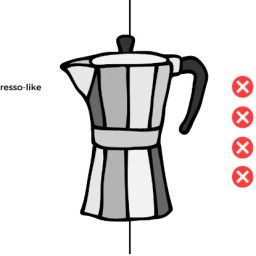
Coffee is one of the most beloved beverages worldwide, celebrated for its rich flavor and invigorating effects. Yet, many people worry about its impact on weight. A common query is, “Does Coffee With Milk Make You Gain Weight?” This question arises because while black coffee is low in calories, the addition of milk, cream, or sugar can significantly increase its caloric content, potentially affecting one’s weight management efforts.
Contrary to some beliefs, coffee alone does not cause weight gain. It’s essentially a zero-calorie beverage if consumed black. The real culprits are the additions we often blend into our brew—milk, cream, and sugar. These additives can transform an innocuous cup of coffee into a hidden source of extra calories. For instance, a tablespoon of cream adds about 52 calories, while a single teaspoon of sugar adds an extra 16 calories. These can quickly add up, especially if you enjoy multiple cups a day or prefer your coffee on the sweeter, creamier side.
Key Takeaways about Does Coffee With Milk Make You Gain Weight
- Understand the Calories in Additives: Being aware of the calorie content in your coffee additives is crucial. Opting for low-fat milk or using sweeteners judiciously can help manage the calorie impact.
- Metabolic Boost from Caffeine: Caffeine can enhance metabolism and even suppress appetite in the short term, which might help with weight control. However, the effects are generally modest and should not be relied upon solely for weight loss.
- Impact of Regular, Sweetened Coffee Consumption: Habitually consuming sweetened coffee can lead to long-term weight gain. It’s important to consider not just the immediate effects but also the cumulative impact of your daily coffee habit on your overall calorie intake.
Composition and Caloric Impact of Coffee Additives
When it comes to coffee, it’s not just the caffeine that perks us up; it’s also the ritual of how we prepare it. Many of us can’t imagine starting our day without our favorite brew, often customized with various additives like milk, sugar, or cream. However, these additions can significantly impact the overall caloric content of our coffee, affecting our daily calorie intake and, potentially, our weight management efforts.
Milk: From Skim to Cream
The type of milk you pour into your coffee can drastically alter its calorie count. For instance, one tablespoon of skim milk contains about 5 calories, whereas the same amount of whole milk has around 9 calories. If you’re partial to richer varieties, half-and-half offers about 20 calories per tablespoon, and heavy cream packs about 52 calories for the same amount.
Over the course of a day, switching from heavy cream to skim milk in your four daily cups of coffee could save you 188 calories—enough to make a difference in weight management over time.
Sweetening the Deal
Sugar is another popular coffee additive, with each teaspoon adding about 16 calories to your cup. While this might not sound like much, multiple cups a day or a preference for sweeter coffee can increase your daily calorie intake substantially.
For those who prefer a sweeter taste without the calorie hit, artificial sweeteners might seem like an attractive option, though they come with their own health considerations and potential impacts on cravings and appetite.
Creamers and Flavored Syrups
Flavored creamers and syrups can transform a simple coffee into a dessert-like treat. However, these products often contain a significant amount of calories. A single tablespoon of flavored liquid creamer can have between 20 to 35 calories, and gourmet syrups can add 20 calories per pump.
If you use multiple pumps or mix different flavors, the calorie content can quickly add up, turning your morning pick-me-up into a high-calorie indulgence.
Cumulative Impact
The cumulative effect of these additives can be substantial, particularly for those who drink multiple cups of coffee throughout the day. For example, if you have three cups of coffee a day, each with two tablespoons of heavy cream and two teaspoons of sugar, you’re adding about 324 calories daily just from your coffee.
Over a week, that’s an extra 2,268 calories—equivalent to about two-thirds of a pound of body weight in calorie terms.
Making Healthier Choices
If you’re looking to enjoy your coffee without significantly impacting your calorie intake, consider these tips:
- Switch to lower-calorie milk options like skim or almond milk.
- Reduce the amount of sugar gradually to lessen its impact on your taste preference and overall calorie consumption.
- Choose natural sweeteners or flavor enhancers like cinnamon or vanilla extract, which can enhance the taste without the extra calories.
Metabolic Effects of Coffee and Caffeine
Caffeine, a central nervous system stimulant found abundantly in coffee, is well-known for its ability to enhance metabolism. By stimulating the nervous system, caffeine signals fat cells to break down fat. It also increases adrenaline levels in your blood, which further helps to break down fats. These processes can boost your metabolic rate by 3-11%, aiding in weight management. However, the effect can vary significantly between individuals, influenced by factors like age and caffeine tolerance.
Balancing coffee intake is crucial. While a moderate amount of caffeine can provide metabolic benefits without adverse effects, high consumption can lead to increased heart rate, anxiety, and disturbed sleep patterns, which may indirectly affect weight management. It’s important to consider not just the amount of coffee you drink but also the overall quality of your diet and lifestyle.
Lifestyle and Consumption Patterns
The way we consume coffee can play a significant role in its impact on our weight. For many, coffee is a low-calorie way to boost energy levels, but for others, it’s a vehicle for sugar and cream. These additions are where calories can add up, potentially leading to weight gain.
Here are some tips to modify your coffee habits for better weight management:
- Opt for black coffee to enjoy the metabolic benefits without added calories.
- Be cautious with timing: Drinking coffee late in the day can disturb sleep patterns, indirectly affecting weight control.
- Monitor your portions: Stick to one or two standard-sized cups a day to keep caffeine intake within a healthy range.
FAQs
Can decaf coffee affect weight gain?
Decaf coffee, which has had most of the caffeine removed, presents a similar profile to regular coffee when it comes to calories: nearly zero. However, the same rules apply—what you add to it matters. Decaf can be part of a weight-maintaining diet if consumed without high-calorie additives like cream and sugar.
How much coffee is too much for maintaining weight?
Moderation is key in maintaining weight when it comes to coffee consumption. Generally, 1-2 cups a day are considered reasonable. More than this can lead to excessive calorie intake if your coffee has added ingredients, and too much caffeine can disrupt sleep and increase stress, indirectly affecting weight.
Does the time of day affect the weight impact of coffee?
Yes, the timing of your coffee intake can influence weight management. Drinking coffee late in the day may disrupt sleep, and poor sleep has been linked to weight gain. Aim to consume coffee earlier in the day to minimize its impact on sleep and maintain healthy weight management.
Final Thoughts
In this discussion about coffee and its impact on weight, we’ve uncovered that while coffee itself is not a direct cause of weight gain, the additives commonly mixed into it, like sugar and cream, can significantly increase its caloric content. We’ve also seen that caffeine has a modest effect on metabolism, which can aid in weight control, but this should be balanced with overall diet and consumption habits.









